The Iliad (Penguin Classics) Read online
Page 13
Aetolia
The contingent from Aetolia was led by Thoas, Andraemon’s son. It contained men from Pleuron (640) and Olenus, Pylene, Chalcis by the sea and rocky Calydon. Thoas led them because the sons of great-hearted Oeneus were dead; so was Oeneus himself; and so was auburnhaired Meleager, on whom lordship over all the Aetolians had devolved. This contingent came under Thoas’ command in forty black ships.
Crete
The contingent from Crete was led by the great spearman Idomeneus. It contained men from Cnossus, from well-walled Gortyn, from Lyctus, Miletus, chalky Lycastus, Phaestus and Rhytion, welcoming towns all of them, (650) and other troops that had their homes in Crete with its hundred towns. The great spearman Idomeneus and Meriones, equal of the murderous War-god Ares, led these troops. This contingent came under their two leaders’ command in eighty black ships.
Rhodes
The contingent from proud Rhodes was brought by Tlepolemus, the tall and handsome son of Heracles, in nine ships. The Rhodians occupy three separate parts of the island, Lindus, Ialysus and chalky Cameirus. The famous spearman Tlepolemus who led these forces was son of mighty Heracles by Astyocheia. Heracles carried her off from Ephyre (660) and the River Selleïs after sacking many of their chieftains’ strongholds. Tlepolemus, when he had grown to manhood in the palace at Tiryns, killed his own father’s uncle, Licymnius, ally of the War-god, who was an old man by then. Tlepolemus immediately built some ships, gathered a large following and fled overseas, menaced as he was by the other sons and grandsons of mighty Heracles. Thus, as a fugitive and after many hardships, he reached Rhodes. His people settled in three districts according to their tribes and enjoyed the favour of Zeus son of Cronus, (670) lord of gods and men, who showered untold wealth on them.
Syme
The contingent from Syme was brought by Nireus in three trim ships. Nireus was son of Aglaia and lord Charopus, the handsomest Greek that came to Ilium with the exception of matchless Achilles. But he was a weakling and his following was small.
Cos
The contingent from Cos, city of Eurypylus, contained men from that island and Nisyrus, Crapathus and Casus and the Calydnian Isles. It was led by Pheidippus and (680) Antiphus, the two sons of lord Thessalus son of Heracles. This contingent came in thirty hollow ships.
Myrmidons
The Myrmidon contingent contained men that lived in Pelasgian Argos, from Alus and Alope, from Trachis, Phthia and Hellas land of lovely women. They were called Myrmidons, Hellenes and Greeks. Achilles led their fifty ships. But at this time they had forgotten the sound and fury of war, since there was no one to marshal them in battle-order; for swift-footed godlike Achilles was lying by his ships, furious (690) over fair-cheeked Briseis, the girl he had won from Lyrnessus by the sweat of his brow when he sacked Lyrnessus itself and stormed the walls of Thebe and brought down the spearmen Mynes and Epistrophus, the sons of lord Euenus, Selepus’ son. He lay there pining for this girl. But he was soon to arise.
Phylace
The contingent from Phylace contained men from there and from flowery Pyrasus, Demeter’s sanctuary; from Iton mother of sheep, Antron by the sea and Pteleus deep in grass. Warlike Protesilaus led them while he lived, but (700) by now the black earth had received him. So his wife was left in Phylace, her cheeks lacerated and his house half-built. He had been the first of the Greeks to leap ashore, but a Trojan killed him as he did so. However, his followers were not left without a chief, though they did miss their leader. Podarces, ally of the War-god and son of Phylacus’ son Iphiclus, lord of many sheep, commanded them. Podarces was a brother of the great-hearted Protesilaus, a younger brother, the warlike Protesilaus being both the older and the better man. So their troops did not (710) lack a leader, though they missed excellent Protesilaus. This contingent came under his command in forty black ships.
Pherae
The contingent from Pherae contained men who came from there by the Boebeian Lake and from Boebe, Glaphyrae and well-built Iolcus. Admetus’ son Eumelus led them in their eleven ships. Queenly Alcestis, Pelias’ most beautiful daughter, had borne him to Admetus.
Philoctetes’ men
Philoctetes the great archer brought a contingent in seven ships, men from Methone, Thaumacie, Meliboea and rugged Olizon. Each was manned by fifty (720) oarsmen trained to fight with the bow. But Philoctetes lay in agony on the lovely isle of Lemnos where the Greek army had left him, suffering from the poisonous bite of a malignant water snake. So he lay there pining, but the Greeks by their ships were soon to think once more of lord Philoctetes. However, his followers were not left without a chief, though they did miss their leader. Medon, the bastard son of Oïleus, whom Rhene bore to Oïleus sacker of towns, commanded them.
Tricce
The contingent from Tricce, from Ithome with its terraced hills and from Oechalia, the city of (730) Oechalian Eurytus, was led by two sons of Asclepius, the admirable healers Podaleirius and Machaon. This contingent came in thirty hollow ships.
Ormenion
The contingent from Ormenion and the spring of Hypereia, from Asterion and the white towers of Titanus, was led by Eurypylus, Euaemon’s splendid son. This contingent came under his command in forty black ships.
Argissa
The contingent from Argissa and from Gyrtone, Orthe, Helone and the white town of Oloosson (740) was led by resolute Polypoetes with Leonteus, both Lapiths. Polypoetes was son of Peirithous, son of immortal Zeus. Famous Hippodameia had conceived him for Peirithous on the day when Peirithous took his revenge on the Centaurs, shaggy people of the wilds, expelled them from Mount Pelion and drove them into the hands of the Aethices. Polypoetes was not alone but shared his command with Leonteus, ally of the War-god and son of proud Coronus son of Caeneus. This contingent came under their leaders’ command in forty black ships.
Cyphus
From Cyphus, Gouneus brought a contingent in twenty-two ships, consisting of Enienes and resolute (750) Peraebians who built their homes round wintry Dodona and tilled the fields by the delectable Titaressus; this river pours its lovely stream into the Peneus, yet does not mingle with the silver eddies of Peneus but floats along on top of them like olive-oil, being a part of the waters of Styx, the river of the dread oath.
The Magnetes
The Magnetes came in a contingent led by Prothous son of Tenthredon. The Magnetes lived by the Peneus and by Mount Pelion of the trembling leaves. These were the men that swift Prothous led. This contingent came under his command in forty black ships.
(760) (Best Greek men and horses, except Achilles) These then were the leaders and commanders of the Greeks. Now you tell me, Muse, of all the men and horses that crossed with Agamemnon and Menelaus, which were by far the best?
Of the horses, the best by far were the mares of Admetus which his son Eumelus drove. Swift as birds, they were alike in coat and age and of exactly equal height. These mares had been reared in Peraea by Apollo lord of the silver bow to strike panic in the ranks.
(770) Of the men, Ajax son of Telamon was by far the best but only while Achilles was in a rage since he, matchless son of Peleus, was the finest man of all and drove the finest horses. But he was lying now by his seafaring beaked ships, nursing his implacable anger against Agamemnon son of Atreus, shepherd of the people. Meanwhile on the beach his men amused themselves with archery and throwing discuses and spears; the horses stood idle, each by its own chariot, munching clover and parsley from the marsh; their masters’ chariots lay covered up inside their huts; and the men themselves, who missed their war-loving chief, strolled aimlessly about the camp and did no fighting.
(780) The Greeks advanced as if fire was grazing over the whole land. Earth groaned beneath them, as it does when Zeus who delights in thunder is angry and lashes the ground above the giant Typhoeus in the Arimean mountains, where people say Typhoeus sleeps. So the earth groaned loudly under the feet of marching men as they advanced at speed across the plain.
IRIS warns the Trojans
&nbs
p; The messenger goddess swift Iris, quick as the wind, was sent to the Trojans by Zeus who drives the storm-cloud with the bad news. They had all (790) gathered, young and old alike, in assembly at Priam’s gates. Swift-footed Iris came up to them and spoke in a voice like that of Priam’s son Polites, who because of his speed was posted as lookout for the Trojans on top of old Aesyetes’ tomb, waiting for an attack from the Greek ships. Swift-footed Iris spoke with his voice:
‘Venerable sir, you are still as fond of interminable talk as you were in peace-time. But inescapable war is upon us. Indeed, I have taken part in many battles, but I have never seen so great (800) and formidable a force. They are advancing over the plain to fight at the town, like the leaves of the forest or the sands of the sea. Hector, I urge you above all to do as I say. In his great town, Priam has many allies. But these scattered foreigners all speak different languages. Let their own commanders in each case issue orders to them, draw up their people and lead them out to battle.’
So she spoke, and Hector did not fail to recognize the words of a goddess and immediately dismissed the assembly. They rushed to arms. The gates were all thrown open and the whole (810) army charged out, foot-soldiers and charioteers. The noise they made was tremendous.
Outside the town and some way off in the plain, there is a high mound with open ground on every side, which men call Bramble Hill, but the immortals call the tomb of dancing Myrine. It was here that the Trojans and their allies were marshalled for battle.
The catalogue of Trojan roops
Priam’s son, great Hector of the flashing helmet, was in charge of the Trojans. With him marched by far the finest and most numerous force, keen spearmen all of them.
The Dardanians were led by Anchises’ admirable son Aeneas, (820) whom celestial Aphrodite conceived for Anchises, goddess sleeping with mortal, on the slopes of Mount Ida. Aeneas was not in sole command, but was supported by Antenor’s two sons, Archelochus and Acamas, both experienced in every kind of fighting.
The men that lived in Zeleia, under the lowest spurs of Mount Ida and drank the dark water of Aesepus – a prosperous Trojan clan – were led by the famous son of Lycaon, Pandarus, whose bow was a gift from Apollo himself.
The men from Adresteia and the land of Apaesus, from Pityeia (830) and the steep slopes of Tereia, were led by Adrestus and Amphius in his linen body-protection, the two sons of Merops of Percote, who was the ablest prophet of his day and had forbidden his sons to go off to the killing fields. But they would not listen to him: the demons of death led them on.
The men who lived in Percote, Practius and in Sestus, in Abydus and holy Arisbe, were commanded by Asius son of Hyrtacus, leader of men, whom his big and glossy horses had brought from Arisbe beside the River Selleïs.
(840) Hippothous was in command of the tribes of Pelasgian spearmen who lived in fertile Larisa. Hippothous was joined in command by Pylaeus, ally of the War-god: they were the two sons of Pelasgian Lethus, son of Teutamus.
Acamas and the warrior Peiros led the Thracians whose lands are bounded by the swift-flowing Hellespont.
Euphemus, son of Olympian-bred Troezenus son of Ceas, led the warlike Cicones.
Pyraechmes commanded the Paeonians with their curving bows. They had come from far, from Amydon and the banks of (850) the broad River Axius – the Axius, whose waters are the most beautiful that flow over the earth.
Manly Pylaemenes led the Paphlagonians from the lands of the Eneti, from which wild mules come. The Eneti lived in Cytorus, round Sesamon, in impressive homesteads by the River Parthenius, in Cromna, Aegialus and lofty Erythini.
Odius and Epistrophus led the Halizones from distant Alybe, the native home of silver.
Chromis and Ennomus were in command of the Mysians. Ennomus was an augur. But all his bird-lore did not save him (860) from the black hand of death. He fell a victim to swift-footed Achilles in the river-bed when he was making havoc of the Trojans and their allies.
Phorcys and godlike Ascanius led the Phrygians, eager for battle, from remote Ascania.
The Maeonians were led by Mesthles and Antiphus, the sons of Talaemenes, whose mother was the Gygaean Lake. These two led the Maeonians whose native land is under Tmolus.
Nastes led the Carians, who do not speak Greek. They lived in Miletus, thickly wooded Mount Phthires, the streams of (870) Maeander and Mycale with its steep peak. These were the men whom Amphimachus and Nastes brought – Nastes and Amphimachus, the splendid sons of Nomion. Amphimachus went into battle decked in gold like a girl, the fool. Not that it saved him from an ugly end. He fell to swift-footed Achilles, there in the river-bed; and warlike Achilles made off with the gold.
Sarpedon and matchless Glaucus led the Lycians, from distant Lycia and the eddying River Xanthus.
3
A DUEL AND A TROJAN VIEW OF THE GREEKS
1 -120: The armies advance to battle, and Paris proposes single combat with Menelaus to end the war. Hector announces the plan, and both sides agree.
121–244: The goddess IRIS tells Helen in Ilium of the impending duel. She comes to the walls of Ilium and describes some Greek heroes to Priam.
245–380: Oaths are taken, and the duel begins. Menelaus is cheated of victory by APHRODITE, who rescues Paris.
380–461: APHRODITE forces a reluctant Helen to go to Paris and make love to him. Agamemnon declares Menelaus the winner of the duel.
When everyone had been drawn up, each contingent under its leader, the Trojans advanced with shrieks and cries like cranes which, screaming from the skies, fly from the onset of winter and its unnatural downpours. Shrieking, they make for the rivers of Ocean to bring death and destruction to the Pygmies, launching their wicked assault from the air. But the Greeks moved forward in silence, breathing courage, filled with determination to stand by one another.
(10) As the south wind wraps a mist around the mountain-tops – bad news for the shepherd but better than night for a thief, and a man can see no farther than he can throw a stone – so dense a cloud of dust arose from their marching feet as they advanced at speed across the plain.
When the armies had come within range of each other, godlike Paris stepped out from the Trojan ranks. He was decked out with a leopard’s skin on his back and a curved bow and a sword. Brandishing two bronze-headed spears, he challenged (20) all the best of the Greeks to meet him face-to-face in mortal combat.
Paris retreats from Menelaus
When warlike Menelaus saw Paris striding towards him in front of the enemy ranks, he was as delighted as a lion that comes across a great carcass and finds it is an antlered stag or wild goat; he is starving and greedily devours it in spite of all the efforts of the quick dogs and strong young hunters to drive him off. So delighted was Menelaus, when his eyes fell on godlike Paris, for he thought his chance had come of paying back the man who had wronged him. Fully armed, he immediately leapt from his chariot to the ground.
(30) When godlike Paris saw Menelaus emerging through the front ranks, his heart failed him completely and he retreated into his own contingent of warriors to avoid death. Like a man who catches sight of a snake in a wooded ravine and sharply recoils, knees trembling, and retreats, pale-faced, so godlike Paris disappeared back into the mass of proud Trojans, terrified of Menelaus son of Atreus.
Hector saw him and attacked him sharply:
‘Paris, you parody, with your wonderful looks, you sex- (40) crazed seducer, you should never have been born, or married. How I wish that were the case! Far better that than to be the disgrace you are now, trusted by nobody. How the longhaired Greeks must cackle when they see us make a champion of a man because of his good looks, not his strength of purpose or courage.
Hector abuses Paris: duel with Menelaus proposed
‘Can you be the same man who picked a crew, crossed the waves in your seafaring ships, mixed with foreigners and carried off a beautiful woman from a distant land, and from a warrior family too, Helen, (50) to be a scourge to your father, to the town and to the whol
e people, to cause our enemies to rejoice and you to hang your head in shame? And won’t you now stand up to warlike Menelaus? Then you would soon find out the kind of man he is whose luscious wife you stole. Your lyre would not help you at all, nor Aphrodite’s gifts, your lovely locks and pretty face, when you mixed with the dust. But the Trojans are too soft. Otherwise you would have been stoned to death long ago for the trouble you have caused.’
Godlike Paris replied:
‘Hector, your taunts are justified, nothing more than I deserve. (60) Your heart is tireless, like an axe in the hands of a carpenter, hewing through the wood. The carpenter’s skill shapes a ship’s timbers, but the axe gives him the strength he needs. So with you – your strength of purpose remains indomitable. But don’t hold against me the irresistible gifts I have from golden Aphrodite. The glorious gifts which the gods themselves choose to lavish on a man are not to be despised; no man ever acquires them by his own efforts.
‘But now, if you want me to do battle and fight, make the rest of the Trojans and all the Greeks sit down and let me and (70) warlike Menelaus meet in the middle to fight it out over Helen and all the property I brought back with her. The one who wins and proves himself the better man can take all the property and the woman home, while you others can then swear solemn oaths of friendship with the enemy and remain in fertile Troy, while the Greeks return to horse-grazing Thessaly and Achaea with its lovely women.’
So he spoke, and Hector was delighted at his proposal. He stepped out into no-man’s-land and, grasping his spear by the middle, pushed the Trojan ranks back. They all sat down; but (80) the long-haired Greeks began to shoot at him, making Hector the target for their arrows and stones. Then Agamemnon lord of men gave a great shout:

 The Odyssey
The Odyssey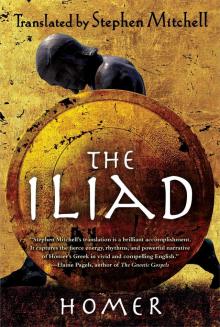 The Iliad
The Iliad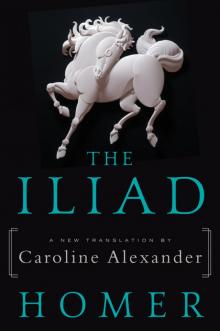 The Iliad (Trans. Caroline Alexander)
The Iliad (Trans. Caroline Alexander)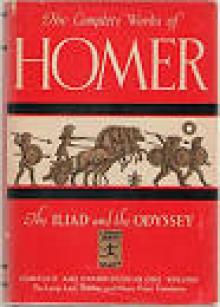 Complete Works of Homer
Complete Works of Homer The <I>Odyssey</I>
The <I>Odyssey</I>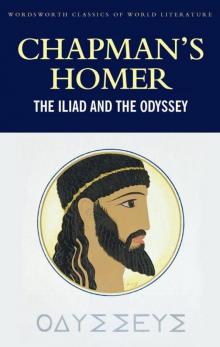 The Iliad and the Odyssey (Classics of World Literature)
The Iliad and the Odyssey (Classics of World Literature)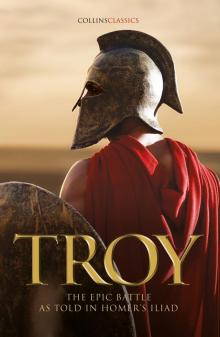 Troy
Troy The Iliad (Penguin Classics)
The Iliad (Penguin Classics) Delphi Poetry Anthology: The World's Greatest Poems (Delphi Poets Series Book 50)
Delphi Poetry Anthology: The World's Greatest Poems (Delphi Poets Series Book 50)